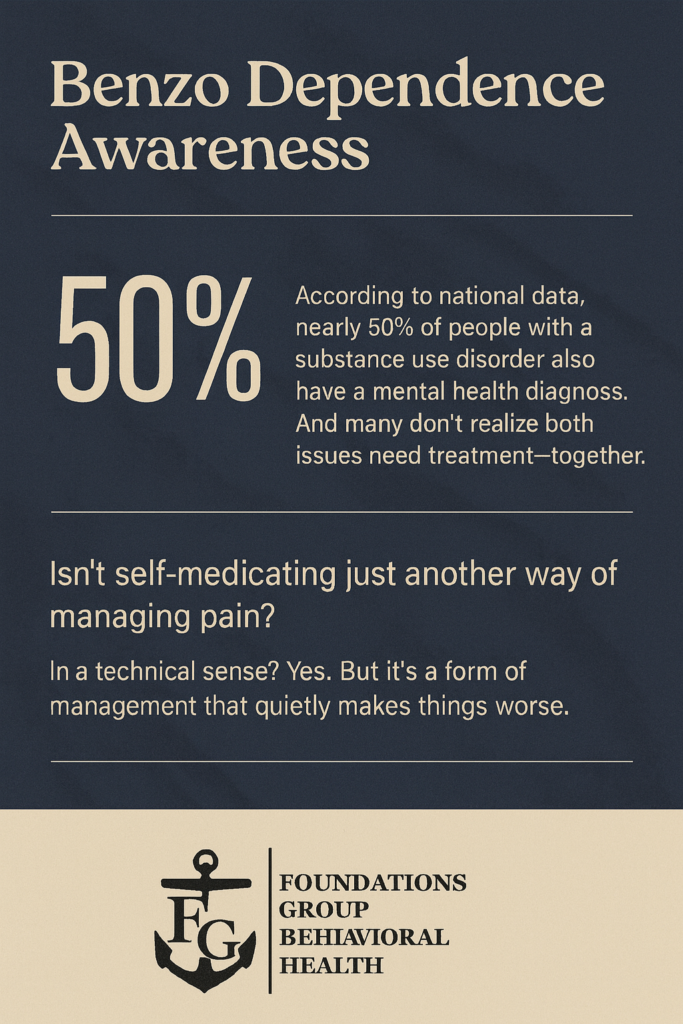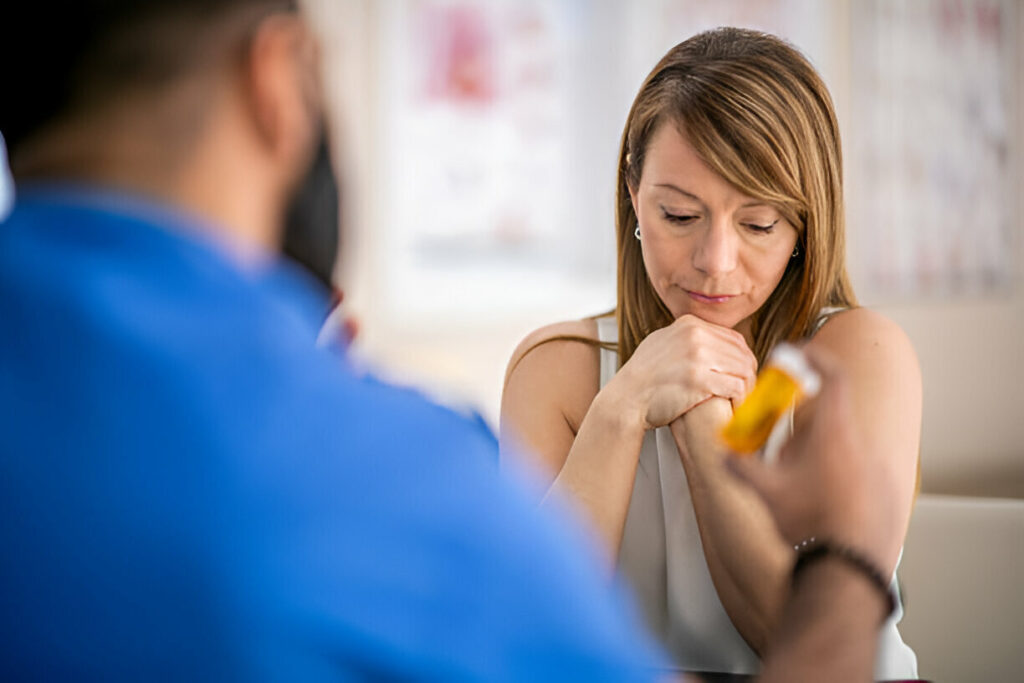When you’re in love with someone who’s using, the lines blur fast.
They’re not out partying every night. They’re not trying to get high for fun. They’re trying to sleep. To stop the thoughts. To make it through the next five minutes without feeling like they’re unraveling.
So you tell yourself: it’s not addiction. It’s self-medicating. It’s trauma. It’s pain. It’s just temporary.
And that might be true—until it isn’t.
This blog is for the ones holding on. The ones who are exhausted by guessing what’s happening. The ones who still see the person underneath, even when the substance use clouds everything.
Isn’t self-medicating just another way of managing pain?
In a technical sense? Yes. But it’s a form of management that quietly makes things worse.
Self-medicating happens when someone uses alcohol, drugs, or other behaviors (like gambling or sex) to numb mental or emotional distress. It’s not always dramatic. Sometimes it’s just one drink to take the edge off. One pill to sleep. One hit to stop the panic.
But the key difference between self-medicating and healing is this:
Self-medicating quiets the pain temporarily. Treatment teaches a person how to live with it—and eventually, through it.
Pain doesn’t mean someone is broken. But using to avoid pain often means that person has never been taught how to face it safely. That’s where treatment comes in.
How do I know if my partner is self-medicating—or if it’s something more serious?
Here’s a gut-check question:
Are they using to feel better, or are they using because they don’t know how to function without it?
Self-medicating can start as an occasional crutch. But over time, that crutch becomes a limb. If your partner’s anxiety feels unmanageable without weed… if they’re drinking every night to fall asleep… if they isolate when they’re not using—it may be more than a bad coping mechanism. It might be a co-occurring disorder.
And here’s the truth: it’s common.
According to national data, nearly 50% of people with a substance use disorder also have a mental health diagnosis. And many don’t realize both issues need treatment—together.

What makes Dual Diagnosis Treatment different?
Most traditional programs separate mental health and addiction. You go to one place for anxiety. Another for alcohol. Maybe neither talks to each other. It’s like trying to patch a leak in your roof while ignoring the hole in the wall from the rain.
Dual Diagnosis Treatment doesn’t make you choose.
At Foundations Group Behavioral Health in Cape Cod, MA, our approach is fully integrated. That means clients are supported by professionals who understand how substance use and mental health symptoms overlap—and how to treat both without judgment.
So if your partner is using because they’re drowning in PTSD…
Or if they started drinking after losing a job, then spiraled into depression…
Or if they’ve been cycling through meds and still can’t sleep without a substance…
This is the kind of treatment that actually sees the whole picture.
Learn more about our Dual Diagnosis Treatment program here.
My partner says they’re “just using to cope.” Does that mean they don’t need help?
Let’s flip that. If the only way someone knows how to cope is by escaping their own mind—don’t they deserve support?
“Just coping” isn’t a reason to ignore the pain. It’s often the first breadcrumb on a much longer path of suffering.
The truth is, people self-medicate because they want to feel better. That’s not wrong. But it rarely works long-term. It can delay healing. It can make their world smaller. It can make you, as their partner, feel like you’re slowly disappearing from their inner circle—watching them rely on something you can’t compete with.
Dual Diagnosis Treatment says: we get it. You weren’t trying to become dependent. You were trying to survive. Now let’s try something else.
Why does it feel like I’m the only one trying to fix this?
Because you probably are.
And that doesn’t make you wrong. It just makes you human.
When you love someone in active use, you start playing detective, nurse, therapist, bodyguard, and clean-up crew—all while trying not to shatter yourself. You remember who they were before. You hope that version is still in there. And sometimes, they are. But the pain they’re running from is stronger than your love can fix.
Here’s the heartbreaking truth:
You can love them deeply and still be powerless to save them.
But you’re not powerless to care for yourself. There are family support groups. Therapists who specialize in loved ones of those with co-occurring disorders. And treatment centers, like ours, that will never blame you for caring—but also won’t ask you to sacrifice your sanity to prove it.
What if they’re not “bad enough” for treatment?
That’s one of the most dangerous myths in recovery culture:
That someone has to hit rock bottom to deserve help.
In reality, the earlier someone enters treatment, the better their outcomes. Especially in Dual Diagnosis care, where early mental health support can stop a slow slide into dependence.
Here are some signs your partner may benefit from treatment—even if they’re still functioning on the surface:
- They’re using substances to manage emotions, not just for social reasons
- They’ve tried to stop or cut back and couldn’t
- Their mood, energy, or behavior changes when they’re not using
- You’ve noticed increased secrecy, withdrawal, or defensiveness
- They’re using alone more often than with others
If any of this sounds familiar, trust your gut. The problem doesn’t have to be dramatic to be real.
Does love mean staying no matter what?
Love means compassion.
Love means hope.
But love does not mean losing yourself.
You can stay. You can leave. You can set boundaries. You can draw a line and still care.
Dual Diagnosis Treatment doesn’t force those decisions. But it gives you language for what’s happening. It gives your partner the tools to show up differently. And it gives you—finally—a chance to feel less alone in this.
How can I start the conversation with them?
Gently. Without accusation. And with honesty about your own fear and fatigue.
Here’s one way:
“I know you’re going through something heavy, and I’m not here to judge it. But I also know that using to cope is hurting you—and it’s hurting us. I found a place that understands both the mental health side and the substance side. I’d love if you’d just look at it.”
No pressure. Just a seed. And then, let it breathe.
When should I talk to someone about getting help—for them or for me?
You already are. Reading this blog is part of that step.
If your partner is struggling and you’re not sure what’s next, call us. We’ll help you figure out if our Dual Diagnosis program is a good fit—or point you to resources that are.
Ready to take the next step?
Call 888-685-9730 or visit our Dual Diagnosis Treatment program in Falmouth County, MA.
Whether you’re reaching out for them or for yourself, we’ll meet you with care—not pressure.








